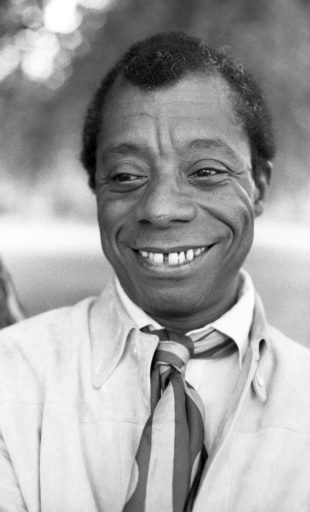“…cans of beans and soup and dog food, along with toilet paper, corn flakes, sardines and milk… “
“…the fish… the cucumbers, the watermelons, the green-leeks, the onions, and the garlic!”
Abundance. Scarcity. Waste.
In every generation.
*
In every generation, we say during the Passover seder, we are to feel as if we ourselves were freed from Egypt.
*
In the desert, nothing but desert. As far as the ear can hear. Nothing to look forward to. So, look back. That’s what the people freed from Egypt did.
*
I’m looking back. Even as recently as a few months ago, I declared, I’m a Jew. My history is the history of the Jewish people. I just happen to live here, but I don’t think of myself as American. Now I’m starting to see: I’m American. A white, American man.
I’m looking back. I’m reading James Baldwin, his essay “Notes of a Native Son.” His father dies. On the same day, his father’s last child is born. A few days later, his father is buried. On the same day, Baldwin celebrates his 19th birthday. That night, a race riot breaks out in Harlem. On the streets, Baldwin sees “cans of beans and… “. I’m reminded of the Children of Israel who complain to Moses: “Who will give us meat to eat,” they ask. “We recall the fish that we used to eat in Egypt for free…“ (NUM 11:5).
Enslaved mind. We used to eat in Egypt for free.
Which way is freedom?
*
In “Notes,” Baldwin considers his father, a difficult man: “bitter,” “chilling,” and “cruel.” Baldwin considers his father’s view of white people: “white people would do anything to keep a Negro down.” When he was growing up, Baldwin did not share that assessment. A year before his father’s death, Baldwin moves to New Jersey. There he experienced for himself the ways whites treat blacks. Baldwin considers the conditions of black life, especially in the summer of 1943. WW II. Black soldiers are serving in the U.S. military. Even in the military, black soldiers suffer the same kinds of racism that black civilians do. Consequently, on the night of August 2, 1943, the same day as Baldwin’s birthday and his father’s funeral, Harlem was tense, ripe for a riot.
Not long before that riot, Baldwin himself reached his limits. One night, after several previous occasions of being denied service at diners in New Jersey, something clicked in him. With a white friend at a place in Trenton called the “American Diner,” he was denied service again. He walked out, found an “enormous, glittering and fashionable restaurant” down the road, entered, and sat down at an empty table. When the waitress said “We don’t serve Negroes here,” Baldwin wanted to strangle her, but she wasn’t within reach. So he grabbed a water glass and hurled it at her. She ducked; the glass smashed against a wall. The other patrons and staff charged Baldwin. He fled. That night he realized two things: he could have been murdered, and he could have committed murder. “My life, my real life, was in danger, and not from anything other people might do but from the hatred I carried in my own heart.”
The Harlem riot was sparked by an incident and a rumor that spread quickly after. While Baldwin was “downtown desperately celebrating my birthday,” in the lobby of Harlem’s Hotel Braddock, a white policeman got into a fight with a Negro solider over a Negro girl. The rumor that followed: a white policeman had shot a black soldier who was defending the black girl.
Stores were smashed. Food, clothing, and other goods were strewn over the streets. “Waste,” Baldwin says. “It would have been better to have left the plate glass as it had been and the goods lying in the stores.” “It would have been better,” he continues, “but it would also have been intolerable, for Harlem needed something to smash. To smash something is the ghetto’s chronic need. Most of the time it is the members of the ghetto who smash each other, and themselves. But as long as the ghetto walls are standing there will always come a moment when these outlets do not work.”
Then there was his father, with whom Baldwin had hardly ever spoken. Baldwin was “contemptuous” of his father, because of the “conditions of his life” and the “conditions of our lives.” His father “claimed to be proud of his blackness, but it had also been the cause of much humiliation and it had fixed bleak boundaries on his life.”
*
“[W]e shared,” Baldwin writes of his father in the beginning of “Notes,” “in our different fashions, the vice of stubborn pride.” By the end of his inquiry into his father, himself, and other black Americans, Baldwin’s pride gives way to humility.
“As for me and my house,” his father had preached many times, “we will serve the Lord.” Baldwin wondered, as he drove his father’s body toward the cemetery, what the line meant to him. Suddenly, “all of my father’s texts and songs, which I had decided were meaningless, were arranged before me at his death like empty bottles, waiting to hold the meaning which life would give them for me. This was his legacy: nothing is ever escaped.”
What does he find when he looks directly at things from which he had tried to escape? First, this: “Hatred, which could destroy so much, never failed to destroy the man who hated….“ Then he experiences an expansiveness, a kind of freedom that enables him to hold at once two opposing ideas.
“The first idea,” he writes, “was acceptance, the acceptance, totally without rancor, of life as it is, and men as they are: in the light of this idea, it goes without saying that injustice is just a commonplace. But this did not mean that one could be complacent, for the second idea was of equal power: that one must never, in one’s own life, accept these injustices as commonplace but must fight them with all one’s strength. This fight begins, however, in the heart and it now had been laid to my charge to keep my own heart free of hatred and despair.”
*
I am a Jew and a white American. Thanks to Baldwin and many others, I’m beginning to see that clearly now. In my heart now? Shame for having been blind to my position in America, pain for the suffering that my benefiting from systemic oppression has caused, commitment for the years remaining to me to learn what I must and do what I must to help create an equal and just society.
Where does Baldwin wind up? With a heavy heart and a wish that his father, now “irrecoverable,… had been beside me so that I could have searched his face for the answers which only the future would give me now.”
Richard Chess directed the Center for Jewish Studies at UNC Asheville for 30 years. He helps lead UNC Asheville’s contemplative inquiry initiative. He is a board member for the Center for Contemplative Mind in Society. He’s published four books of poetry, the most recent of which is Love Nailed to the Doorpost. You can find him at http://www.richardchess.com





